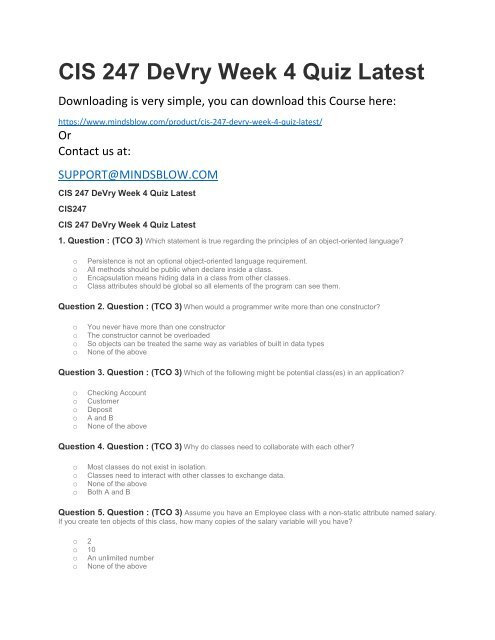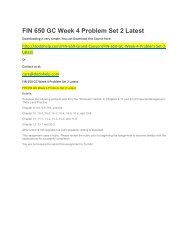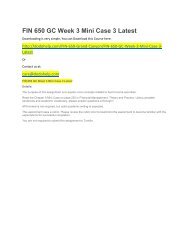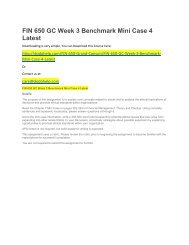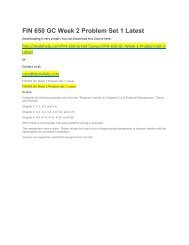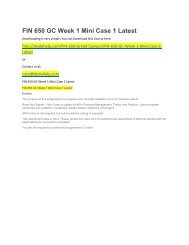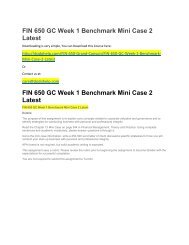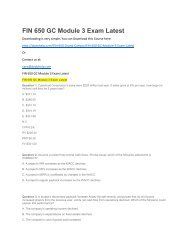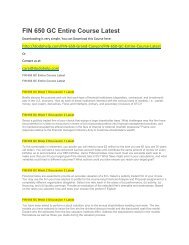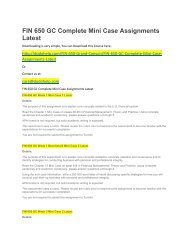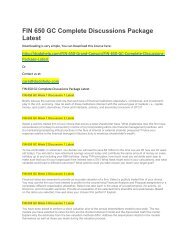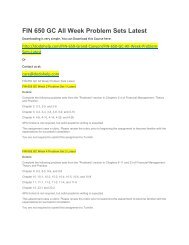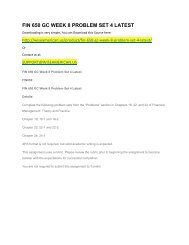CIS 247 DeVry Week 4 Quiz Latest
Create successful ePaper yourself
Turn your PDF publications into a flip-book with our unique Google optimized e-Paper software.
<strong>CIS</strong> <strong>247</strong> <strong>DeVry</strong> <strong>Week</strong> 4 <strong>Quiz</strong> <strong>Latest</strong><br />
Downloading is very simple, you can download this Course here:<br />
https://www.mindsblow.com/product/cis-<strong>247</strong>-devry-week-4-quiz-latest/<br />
Or<br />
Contact us at:<br />
SUPPORT@MINDSBLOW.COM<br />
<strong>CIS</strong> <strong>247</strong> <strong>DeVry</strong> <strong>Week</strong> 4 <strong>Quiz</strong> <strong>Latest</strong><br />
<strong>CIS</strong><strong>247</strong><br />
<strong>CIS</strong> <strong>247</strong> <strong>DeVry</strong> <strong>Week</strong> 4 <strong>Quiz</strong> <strong>Latest</strong><br />
1. Question : (TCO 3) Which statement is true regarding the principles of an object-oriented language?<br />
o<br />
o<br />
o<br />
o<br />
Persistence is not an optional object-oriented language requirement.<br />
All methods should be public when declare inside a class.<br />
Encapsulation means hiding data in a class from other classes.<br />
Class attributes should be global so all elements of the program can see them.<br />
Question 2. Question : (TCO 3) When would a programmer write more than one constructor?<br />
o<br />
o<br />
o<br />
o<br />
You never have more than one constructor<br />
The constructor cannot be overloaded<br />
So objects can be treated the same way as variables of built in data types<br />
None of the above<br />
Question 3. Question : (TCO 3) Which of the following might be potential class(es) in an application?<br />
o<br />
o<br />
o<br />
o<br />
o<br />
Checking Account<br />
Customer<br />
Deposit<br />
A and B<br />
None of the above<br />
Question 4. Question : (TCO 3) Why do classes need to collaborate with each other?<br />
o<br />
o<br />
o<br />
o<br />
Most classes do not exist in isolation.<br />
Classes need to interact with other classes to exchange data.<br />
None of the above<br />
Both A and B<br />
Question 5. Question : (TCO 3) Assume you have an Employee class with a non-static attribute named salary.<br />
If you create ten objects of this class, how many copies of the salary variable will you have?<br />
o 2<br />
o 10<br />
o An unlimited number<br />
o None of the above
Question 6. Question : (TCO 3) What does SOW stands for in the object-oriented design process?<br />
o<br />
o<br />
o<br />
o<br />
Sequence of work<br />
Structure of work<br />
Statement of work<br />
None of the above<br />
Question 7. Question : (TCO 3) In the object-oriented design process, which of the following is true?<br />
o The cost of a design change in the implementation phase is very low.<br />
o The cost of a requirement/design change in the design phase is very high.<br />
o The cost of a design change after the deployment phase is astronomical .<br />
o All of the above<br />
o None of the above<br />
Question 8. Question : (TCO 3) To _____ an object is to create it.<br />
o<br />
o<br />
o<br />
o<br />
instantiate<br />
encapsulate<br />
abstract<br />
overload<br />
Question 9. Question : (TCO 3) Every object of the same class _____.<br />
o<br />
o<br />
o<br />
o<br />
gets a copy of every instance variable only<br />
gets a copy of every instance variable and method<br />
gets a copy of every method only<br />
None of the above<br />
Question 10. Question : (TCO 3) Classes do not have the ability to _____.<br />
o<br />
o<br />
o<br />
o<br />
encapsulate data.<br />
enforce information hiding<br />
contain both data and functions<br />
know how other classes are implemented


